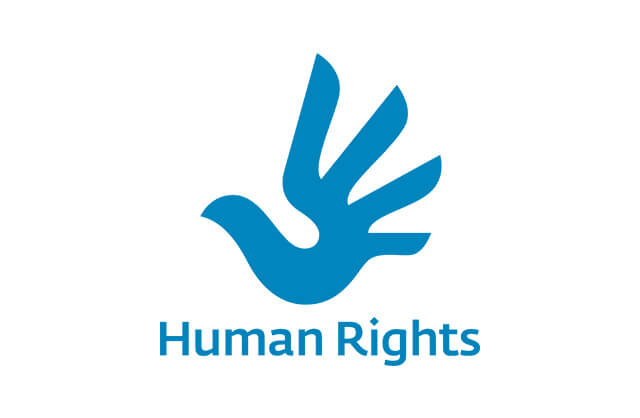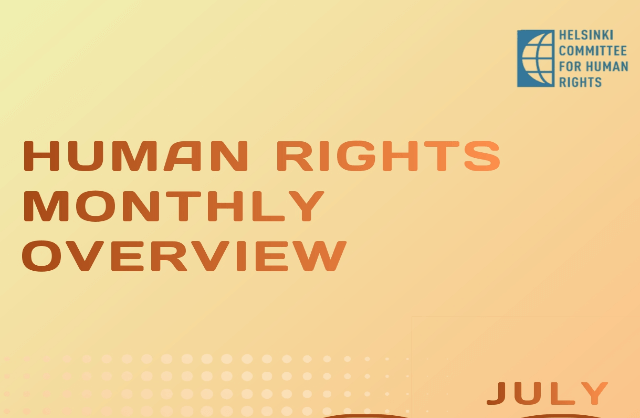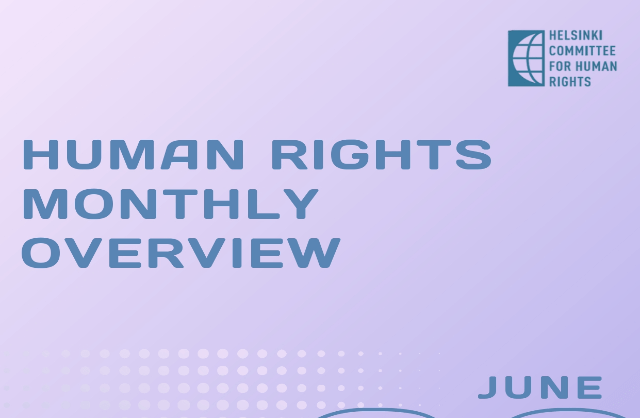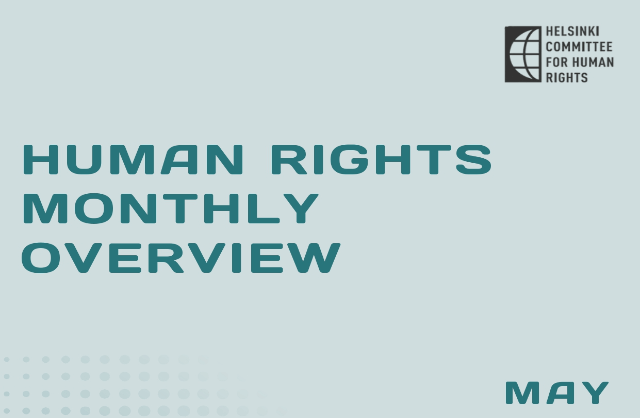Monthly report on Human Rights – July, 2017
October 16, 2017

The monthly report on the human rights situation in the Republic of Macedonia for July 2017 covers topics from the following areas: Discrimination, Hate Speech, Refugee Crisis and Textile Workers.
DISCRIMINATION
Discrimination against disabled persons in wheelchairs at the Olympic swimming pool center
During July, the Helsinki Committee for Human Rights and the Macedonian public were introduced with a case via social networks in which a mother of a child in a wheelchair was prevented from entering the Olympic swimming pool in Skopje. The child’s parent called to inquire about swimming terms and conditions, about the crowdedness, access to the dressing rooms and to the pool, and whether there was a person employed at the pool that would help her with lifting the wheelchair. The answer from the pool’s employee was that, unfortunately, people with disabilities were not allowed to enter the pool. In addition, the employee informed that the pool, unfortunately, has not been provided with a separate entrance for people with disabilities and that for hygienic and safety reasons, movement with a wheelchair through the pool facilities is not allowed. The parent was asked to check the other pools, after which the conversation was ended.
After the stormy public reactions, the managing director of the pool issued a statement regarding the case, saying that no one forbade the mother and the child to come to the swimming pool facility and that the problem is not only with the access to the pool, but in the technicalities involving the use of the swimming pool. According to the managing director, whenever a disabled person with a wheelchair came to the pool, he/she has to go through a gate before entering the pool, which was clearly not adjusted to persons in wheelchairs. The managing director found it impossible to understand how would a disabled person physically get into the swimming pool since there were no specially designed lifts to put the person in the pool, and in his opinion, this was not a case about violating someone’s rights. A far bigger problem pointed out by the managing director is that the swimming pool has neither technical nor financial conditions to guarantee the safety of a person in a wheelchair with a hundred other people in the pool.
According to the Convention on the Rights of Persons with Disabilities[1] ratified by the Republic of Macedonia on 05.12.2011, which contains a special section on accessibility, Member States are obligated to undertake appropriate measures to ensure that private entities offering public facilities and services shall take into account all aspects of accessibility for persons with disabilities. Furthermore, with the Convention, Member States are obligated to take all appropriate measures to enable persons with disabilities to participate on an equal basis with others in recreational, leisure and sporting activities and undertake, to this end, to provide them with unrestricted access to sports, recreational and tourist facilities.
Pursuant to the Law on Prevention and Protection against Discrimination, discrimination against persons with mental and physical disabilities is also identified when facilities fail to take measures for removal of the restrictions, that is, adjustment of the infrastructure and space, publicly available resources, and allowing participation in the public and social life for the disabled.
For the above reasons, the justifications offered by the pool’s owner ‒ that due to technical and financial reasons, access for persons with disabilities cannot be enabled ‒ are unfounded. It is even more unclear how this sports facility obtained a work permit despite the failure to meet the conditions for accessibility in accordance with the legislation. We would like to point out that it is a sports facility that provides public services and has a legal obligation to meet the norms and standards regardless of whether it is in public or private ownership. We would also like to emphasize that most of the facilities in the country are inaccessible to persons with disabilities, which makes them unable to exercise their rights and actively participate in the social and cultural life.
Recommendation:
We strongly condemn the discriminatory attitude identified in Olympic Swimming Pool Center towards disabled persons in wheelchairs. The Helsinki Committee for Human Rights provides legal help in this case and will take all necessary measure in terms of protection of the discriminated persons and in continuing the fight for enabling full accessibility for people with disabilities in all facilities.
HATE SPEECH
Public homophobic hate speech has to be prevented
Hate speech usually occurs as a result of current political events or public social issues. Such is the case during July 2017, when in the beginning of the month, the issue of legalization of same-sex marriages was raised by MP Branko Manojlovski. His position, that same-sex marriages should be legalized in the Republic of Macedonia, was followed by numerous examples of hate speech on the internet ‒ social networks such as Facebook and Twitter. Additionally, elements of hate speech and homophobic statements were noted in posts by public figures and politicians.
The Helsinki Committee would like to point out that the spread of hate speech based on sexual orientation is a crime according to Article 319 of the Criminal Code of the Republic of Macedonia, and it leads to acts of hatred. Particularly important elements that predetermine hate speech are the intention of the speaker, the context of the speech, as well as the negative consequences that follow that speech. Having in mind that homophobic statements have been issued by public figures and politicians, the danger of those statements causing serious consequences is greater due to their influence and role in social context.
Recommendation:
The Helsinki Committee strongly condemns the spread of hate speech based on sexual orientation and urges public figures to refrain themselves from using such speech.
REFUGEE CRISIS
Police action at the refugee camp Tabanovce
The situation with the refugees remained relatively calm in July, with a small number of refugees present in the Reception and Transit Centers on both borders in Vinojug and Tabanovce. There are about 14 refugees in the camp in Vinojug, Gevgelija, while about 25 refugees reside in the camp in Tabanovce, among which there are registered and unregistered refugees.
On 16.07.2017, in the early morning hours, a police action was carried out in the Reception and Transit Center Tabanovce in which police officers took dozens of unregistered refugees who are staying at the camp. According to the testimonies of the refugees staying at the camp, police officers used means of force and excessive force in order to overcome and detain the refugees who started to flee. The reason for the police action and whether the use of force and means of coercion were necessary are unknown. Some of the refugees managed to escape to the camp’s surroundings, and those who were detained were taken to an unknown location. The Helsinki Committee believes that this kind of police behavior is inadequate and illegal, especially since refugees are accepted at the camp by the competent institutions in order to be provided with care, food and water. Moreover, if there were suspicions that they were perpetrators of a criminal act, the police should have acted in accordance with the Law on Police and the Code of Conduct for Law Enforcement, and not to abuse their position and to use inhuman and degrading actions against refugees. Regarding this event, the Helsinki Committee wrote to the Ministry of Interior with the aim of obtaining detailed information on the undertaken police action.
Recommendation:
The Helsinki Committee requests that Department of Internal Control and Professional Standards at the Ministry of Interior conduct an appropriate investigation into the described event as to determine the responsibility of the police officers who have abused their position and who should be appropriately punished.
TEXTILE WORKERS
Meeting held with the Prime Minister of the Republic of Macedonia and the Minister of Labor and Social Policy for textile workers` rights
On 21.07.2017, a representative of the Helsinki Committee participated in a meeting in Stip organized by the Cabinet of the Prime Minister of the Republic of Macedonia, which dealt with the labor rights of textile workers the conditions for work in textile companies, as well as the Draft Law on Amending the Law on Minimum Wage in the Republic of Macedonia. The meeting was attended by the Prime Minister of the Republic of Macedonia Zoran Zaev, the Minister of Labor and Social Policy Mila Carova, the MP Blagoj Bocvarski, representatives of civic associations working on the protection and promotion of textile and leather industry workers’ rights, representatives of the branch Trade Union of textile, leather and shoe industry workers of the Republic of Macedonia, and textile workers themselves.
At the meeting, the Helsinki Committee representative presented the allegations and findings regarding the violation of the textile workers’ labor rights, which the Committee received through documented case studies and regular meetings with textile workers.
The Prime Minister and the Minister of Labor and Social Policy were informed about the following violations of workers’ rights in textile and leather industry:
- Workers are faced with delayed payments of non-payments of salaries and benefits;
- Workers work overtime which greatly exceeds the legally determined maximum of 190 working hours per year, and the overtime is rarely recorded and paid;
- Workers do not receive work-related allowances nor payment for annual leave in accordance with the General Collective Agreement for the private sector.
- Workers often work during holidays and non-working days, while employers rarely inform the State Inspectorate for Labor for these working hours, which should be done in accordance with the Law on Work Relations; workers do not receive compensation for working during holidays and non-working days determined by law;
- Workers receive part of their payments in an envelope;
- Workers have poor hygienic, health, sanitary and safety conditions in the workplace;
- Workers do not have the right to an annual leave, which is in accordance with the Law on Work Relations and the General Collective Agreement for the private sector;
- Workers sign blank documents, which are later abused by employers, most often for “amicable” termination of employment contracts.
The Helsinki Committee representative welcomed the Draft Law on Minimum Wage, according to which the minimum wage will be 12,000 MKD and in which the section for piece-rate pay (or standardized performance) in the textile and leather industry will be eliminated, but also pointed out that even two minimum monthly wages of that amount could not cover the monthly living expenses of a four-member family according to the minimum consumer basket of the Federation of Trade Unions of the Republic of Macedonia.
Furthermore, the meeting covered the inefficient and ineffective treatment of the regional labor units of the State Labor Inspectorate who often need several months to go on the field and to carry out extraordinary supervision upon a submitted request. Therefore, an increased and enforced supervision over the State Labor Inspectorate’s work was suggested.
At the meeting, the difficulty textile workers face in access to justice was also discussed. Due to the high judicial, legal and administrative costs, textile workers are almost never able to seek judicial protection of their labor rights, nor can they request payments from their employer. The Helsinki Committee representative proposed changes and amendments to the Law on Free Legal Aid in the part referring to the conditions for using the right to free legal aid in order to expand the scope of persons who could use this right.
Recommendation:
The Helsinki Committee applauds the initiative by the Prime Minister of the Republic of Macedonia for holding a joint meeting and the desire for collaboration in order to improve and promote the labor rights of textile workers. The result of these meetings remains to be seen and we expect changes which will result in improvement of the working conditions in the textile industry and respecting existing laws.
[1] https://www.un.org/development/desa/disabilities/convention-on-the-rights-of-persons-with-disabilities.html


